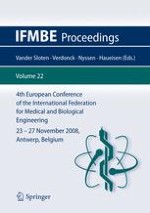2009 | OriginalPaper | Buchkapitel
Anaesthesia with Propofol Reduces Ventricular Rhythm Variability during Atrial Fibrillation
verfasst von : Raquel Cervigón Abad, F. Castells, C. Sánchez, A. Climent, J. Millet
Erschienen in: 4th European Conference of the International Federation for Medical and Biological Engineering
Verlag: Springer Berlin Heidelberg
Aktivieren Sie unsere intelligente Suche, um passende Fachinhalte oder Patente zu finden.
Wählen Sie Textabschnitte aus um mit Künstlicher Intelligenz passenden Patente zu finden. powered by
Markieren Sie Textabschnitte, um KI-gestützt weitere passende Inhalte zu finden. powered by
Since the cardiac activity during atrial fibrillation (AF) may be influenced by autonomic modulations, in this paper were analyzed the effects of a well known anaesthetic in ventricular rate. Indeed, it has been already reported that propofol slows atrial fibrillatory rate, although the effects on the ventricular response are unknown. ECG recordings from 18 AF patients in baseline conditions and during the effect of propofol were studied. For each patient the ventricular response was measured from the analysis of the RR interval and different parameters were obtained, such as mean (Mean RR), standard deviation (SD), relation of SD and Mean RR (CV) and the root-mean-square of successive difference (RMSSD). In addition, the local AF dominant frequency was also extracted at different parts of the atria, and a ratio between atrial and ventricular rates (AVR) was computed. The analysis was carried out during both baseline state and after propofol sedation. The results showed a larger variability in the ventricular response during baseline than after propofol administration: SD (11.17E+01 ± 33 vs. 99.20E+00 ± 38, basal vs. propofol respectively, p=0.023), CV (0.22 ± 0.05 vs. 0.19 ± 0.04, basal vs. propofol respectively, p=0.015), RMSSD (17.10E+01 ± 57 vs. 138.53E+00 ± 50, basal vs. propofol respectively, p=0.020). In addition, AVR decreased under the effects of propofol and became statistically significant when considering the atrial dominant frequency at the septum area (3.06E+03± 7.47E+02 in basal state vs. 2.81E+03± 5.45E+02 during anaesthetic effect, p=0.02). As it can be inferred from this study, the ventricular rate does not decrease jointly with the atrial frequency under the effects of propofol. These results suggest that atrioventricular conduction properties may be modified and a higher ratio of atrial wavelets bombarding the AV node may be captured and conducted towards the ventricles.
